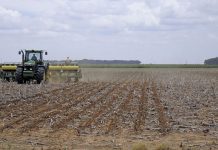The High Court in Pietermaritzburg recently granted an interim interdict to a land owner of Hilton in order to halt the illegal occupation of a tract of his land.
Rusty Roodt, owner of a piece of land in Crompton Road, Hilton near Pietermaritzburg, claimed that the police didn’t act on the land invaders when they were called out. “I had to prove that the land was my property before the police acted,” Roodt said.
“The invaders didn’t have to show that they had a right to invade, but I had to prove I had a right to own the land.” According to The Witness some of the invaders claimed that the “land belongs to [Julius] Malema”.
The reference to the ANC Youth League (ANCYL) leader was confirmed by Pam Passmoor, DA councillor for ward 7 of the uMngeni Local Municipality where the invasion took place.
“It’s quite disconcerting,” she said. She added that the invaders claimed the land was bought by Julius Malema’s Ratanang Family Trust for R2,2 million. However, this is not true. After numerous attempts, the ANCYL could not be reached for comment.
Passmoor added that there were “fancy cars, even a new BMW” parked at the site of the occupation. “It wasn’t only unemployed people.” She confirmed that “the police didn’t help because they haven’t come across land invasions before”, and that cases like this need to be dealt with quickly.
A police officer in the uMngeni Local Municipalty, who asked not to be named, confirmed that it was “the first time since I’ve worked here that we’ve come across something like this”. Without giving details, the officer denied the police had done nothing to prevent the invasion.
Rumblings about land invasions, however, are not new. Sandy la Marque, chief executive of Kwanalu, said that recently during the provincial consultation process on the Green Paper on Land Reform, certain non-governmental organisations concerned with land issues said from the podium that they “will take the law into [their] own hands, guns blazing and with invasions”.
“For [Kwanalu] it’s a concern that there are groupings who clearly want to act outside the rule of law,” she said.
La Marque also urged government to stop blaming everyone else for the failures of land reform. “It’s difficult to draw links between this land invasion case and what has been said at the Green Paper consultations. But seeing people stand on podiums and saying (those) things and a day later hearing of this land invasion taking place is a concern,” she said.
Prof Pierre du Toit, from the department of political science at Stellenbosch University, said the implications of utterances like those of Malema hold grave implications. “Malema excites people by saying their actions (like the invasion) are legitimate though not necessarily lawful. This undermines the rule of law.” Prof Du Toit said that whatever the motives of land invasion are, it indicates unlawful actions.
“During the apartheid years, the government always had a law it acted under. Because many laws didn’t have the backing of the majority of citizens, it was regarded as illegitimate although it was lawful. Malema is trying to say the same: certain laws are lawful, but illegitimate,” said Du Toit.
Land claims are based on historical ownership of the land prior to 1913. However, Roodt claimed that the land which was invaded was the property of a Samuel Green as early as 1857 and was afterwards in the hands of the Green family.
Roodt wants to develop the land and had an environmental impact study done – which included checking if there were any land claims lodged against the property. “There were no claims,” he said. – Jaco Visser








